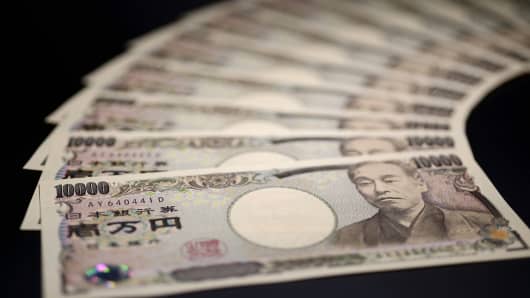The yen may have tumbled 17 percent against the dollar since the start of November, making many currency speculators, including George Soros, rich. But that depreciation could vanish with one analyst telling CNBC that investors shouldn't get too carried away.
"We had a good move with November, December all the way up until January. And now it's really lost some steam," Elsa Lignos a G10 currency strategist at RBC told CNBC Wednesday.
"People are getting to the stage where maybe they're getting to actually want to see some action from the Bank of Japan and the new government rather than just words."
(Read More: Yen Reverses Losses After Mixed Signals From Japan)
The yen has continued to slump in value since the Bank of Japan (BoJ) doubled its inflation target to 2 percent in January, and made an open-ended commitment to continue buying assets next year.
Even before the BoJ's action, talk had focused on the "race to debase" after a leadership change in Japan, with new Prime Minister Shinzo Abe openly calling for aggressive monetary stimulus from the country's central bank.
According to the Wall Street Journal, George Soros' U.S. hedge fund has gained about $1 billion since November by betting against the yen.
But the currency was steady on Wednesday, holding on to recent gains against the dollar and the euro after Abe said in parliament that the need to establish a public-private sector fund to buy foreign bonds had declined. Currency traders may be beginning to get mixed messages from Japan, coinciding with a stabilization in the yen's depreciation.
(Read More: Dollar Jumps After Fed Minutes' Release)
"Fundamentally when you look at the underlying reasons for the dollar/yen rally, I know a lot of people give a lot of reasons, many of them aren't particularly well founded," Lignos said.
"We're ultimately just looking for a much longer-term move and by the end of the year weakness may well have been erased."
This is very much a contrarian view, admits Lignos, adding that there are lots of people out there that expect the dollar to keep rising against the yen, breaking through the 100-mark and even further.
"I like USD/JPY higher from here but I think a plan to buy foreign debt, something that (Finance Minister) Aso has also ruled out, is the only thing that sees further substantial weakness in JPY (above 100.00)," Jeremy Cook from foreign exchange company, World First, told CNBC.com.
"While the unknown effect of U.S. sequestration on Fed monetary policy could easily bring things back to prices in the 80.00s."
(Read More: This Time Around, Abe May Prove He's Got It Right)
The G20 and the G7 both released separate statements last week, trying their best to cool talk of "currency wars". While the statements weren't directly pointing at Japan, Cook says that they did boil down to a "don't push it" message to the country.
"Given monetary policy hasn't really changed materially yet - as open-ended asset purchases don't begin until next year and the higher inflation target is as much a dream as ever – it's tough to be overly critical of a government which is getting the market to do its 'heavy lifting'," he said.



